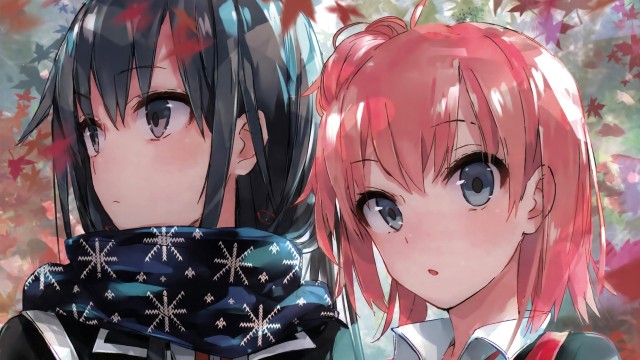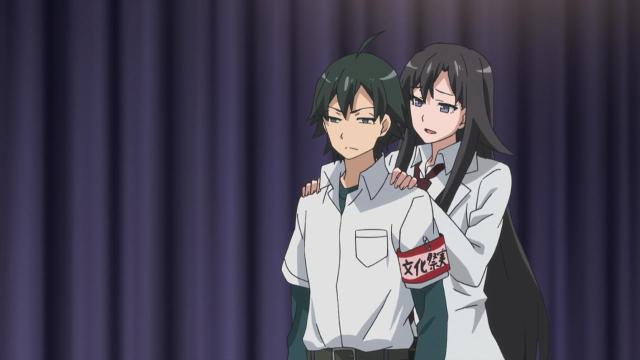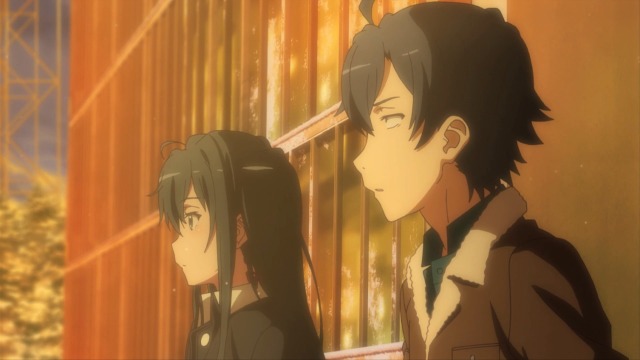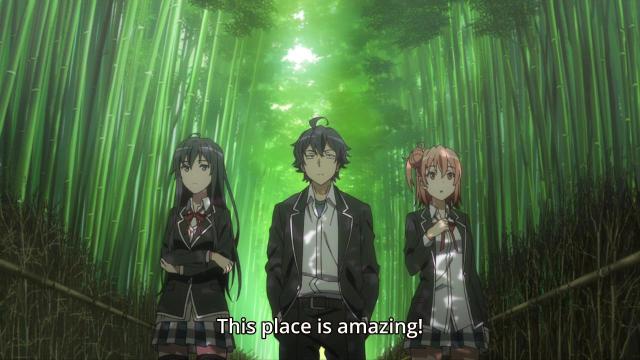
I admit, the older I get, the harder I’m finding it to justify enjoying high school rom-com anime. This isn’t to say I don’t understand why people do — myself chief among them — but people who are on the outside of the anime fandom may find my love of the genre somewhat perplexing if not downright worrying. Even I find it difficult to pinpoint what it is that I enjoy about these anime that I couldn’t find in something more “mature”, and I’m not really sure it’s worth my time right now to think on it too hard. All I really know is that there is a mysterious, emotional draw that the genre has on me. I keep coming back for more, all the while submitting to the usual tropes and cliches and enjoying every second of it, usually.
To be sure, the genre has its share of crap, like anything. Take for instance Kawai Complex, a beautifully-animated but horribly shallow attempt to cash in on every anime romance/harem stereotype that exists. Of all the things I’ve watched so far this year, only Noein was worse, and then only just. But sometimes you just don’t know; sometimes the MAL ratings are terrible lies and you don’t find out until you’re too deep in; sometimes you end up feeling violated, not just because of the content and emotional manipulation (which Kawai Complex excels at), but also because you know that you were just swindled out of your precious time for something that took an ounce of thought to create. Such is the risk one takes, especially in the genre of high school romances, where innovation often takes a backseat to comfort. As a result a lot of the same themes repeat from series to series, in some cases becoming so watered-down and cheap that you end up with things like, well, this. And I think about this and ask myself once again — why do I continue to bother with the genre?
The answer is Yahari Ore. Well, ok, no, that’s not really the answer — frankly, I like plenty of cliche, archetype-ridden shoujo romance anime on the basis of their own merits, no matter how well-trod their territory may be. But Yahari Ore stands as one of the few anime of this type out there that seeks to break the mold, and frankly, does.
At first glance, there’s really no reason to notice this anime at all — the promotional pics for the first and second seasons look like they were put together by a soulless animation studio intern who grew up and works in Genericsville, Japan (just west of Kyoto). The premise is also straight out of the High School Romance Manual for Great Success: Edgy, cynical protagonist Hikigaya Hachiman is forced by his teacher to join the school’s Service Club, a one-person club headed by edgy, cynical loner girl Yukinoshita Yukino. The two hate each other right off the bat but follow through on their first request from eccentric, bubbly Yuigahama Yui, who (gasp) ends up joining their club afterwards.
Look, I’m putting a sarcastic spin on this because, yes, on the surface it’s pretty standard fare for this type of anime. And I can see all these things putting off someone more jaded than I am from ever bothering to pick this up, and I have to say, I pity those people, because Yahari Ore successfully defied every expectation I had of it from almost the first minute. Although there are plenty of broad-scope similarities to other, similar anime (yep, there’s an episode with yukatas and fireworks; yep, there are school rooftops; yep, there are student council shenanigans, and a cultural festival), Yahari Ore differentiates itself in the granular details, the stuff that composes the bigger brush strokes — in other words, the things that matter.
I’m not going to mince words here: Yahari Ore has some of the best characters and character interactions I’ve ever seen in an anime — up there with Ping Pong for sure, and perhaps even better. What makes this the case is not so much the individual personalities of the three main characters — each fascinating in their own right, don’t get me wrong — but the fact that there is total consistency among the three, and the other auxiliary characters, in their words, actions, and choices throughout the anime. Where other anime are driven by a plot — some predetermined endpoint that the storyteller wants them to get to — Yahari Ore is driven by the characters themselves in a much more organic way. This is probably largely because of the fact that the light novel off of which this series is based is not actually finished yet, and if my sources are to be believed, even the author himself doesn’t know where he wants to take it.

The show’s premise doesn’t really change through its two seasons — as things progress, we see various people come to the Service Club asking for help with their issues, most of which have to do with their given social situations. Under these circumstances, our protagonists’ personalities slowly come into focus, as they attack solving these peoples’ problems through their differing worldviews.
The first season manages to stay fairly light in its mood. Although it does have its share of drama, these instances are mostly few and far between, often punctuated by a sarcastic comment from Hikigaya or a tension-breaking quip from Yuigahama. For the first season at least, it is a genuinely funny show, opting far more for comedy than anything else, albeit not in the usual anime way, with silly deformations or hyperactive mood swings. Yahari Ore‘s style of humor is more subtle, and the anime is much better at sarcasm and dark humor than most of its contemporaries.
This is often communicated through Hikigaya’s inner monologue, which would put most other loner teenage boys’ to shame. Hikigaya is, without a doubt, one of my absolute favorite characters from any anime I’ve seen or manga I’ve read, probably ever. He’s a teen of contradictions (aren’t they all?), sharply critical of the social structures that surround him, who pointedly loathes his classmates for conforming to them. He sees them as little more than “pack animals”, looking for people like themselves all for the purpose of self-preservation — hypocrites, in other words. All the while, though, one can’t help but to feel that Hikigaya wishes that he was part of a pack himself, and as the series progresses we’re treated to squeamishly awkward, but often humorous flashbacks to moments in his middle school life that help explain why Hikigaya is how he is. I’ve no doubt that many will find themselves relating to Hikigaya through these uncomfortable vignettes, but I found myself identifying with him in more substantial ways.
As the series progresses, especially as it moves into season 2, there’s a distinct change in tone — while the main characters’ personalities remain fundamentally intact and unchanged, their relationships deepen, and as a result there’s slightly more understanding between them. Weirdly, as things move forward it becomes more and more difficult to categorize what exactly the relationship between the three is — “friendship” is perhaps too strong, “acquaintance” too weak. It’s the odd familiarity that comes with being forced to interact with people you don’t want to, until you unwittingly find yourself comfortable around them, if nothing else. From the outside, it’s a refreshing dynamic rarely explored in anime to the extent it is in this series, and it’s never anything less than deeply engaging to the viewer.
Although the series, at least in these first two seasons, never becomes what I would call “dark”, it gradually twists away from its lighthearted beginning. Hikigaya’s cynicism loses its persuasive tone; Yukinoshita’s calculated, sharp demeanor dulls as we are given fleeting glimpses into her past; Yuigahama’s bright optimism comes to look more and more like a flimsy facade. But it always feels “right”, in the sense that these are the things that should be happening given the circumstances. There is no deus ex machina that ties everything together for these characters. The story ends incomplete, and even if season 3 never materializes, the open-ended nature feels like it could be, in a sense, a proper ending for this particular story. Do people’s stories ever end in real life? How often are things really tied in neat bows? I got the same feeling from the ending of this series as I did when I watched the Kare Kano anime adaptation — incomplete, definitely, but strangely appropriate for the story that was being told.

If I’m being vague here, I apologize — trying to talk about this anime without spoiling major plot points is difficult, if not downright impossible, and I worry that I may have already failed. But it’s an anime I feel like I have to review because it resonated with me deeply. Beneath the exterior of snide sarcasm that is basically the rule by which this anime exists (I mean, even the anime’s title has a sardonic ring to it; when translated, it’s “My Teen Romantic Comedy SNAFU”), the story revolves around selfishness and self-sacrifice and how the two can coexist despite the apparent contradiction. It’s an odd theme, but one that exposes things about the characters that wouldn’t be exposed otherwise, in manners ranging from cringingly humorous (Hikigaya failing to correct a classmate who calls him by the wrong name, which then becomes what a number of others call him), to borderline-tragic.
This is where I began to really identify with Hikigaya, as although I don’t share the same glass-totally-empty pessimism that defines his personality, I do find myself making sacrifices for the sake of others, although not always with entirely pure motives. Throughout the series Hikigaya is often pressured into being, or of his own accord decides to be, the sacrificial lamb in the many social complications that he finds himself in. However, it almost never ends up being solely for the good of others — more often than not, it’s to maintain a status quo, which in most cases makes life easier for Hikigaya. I liked Hikigaya as a character in this regard — despite his outward actions he’s not a role model, and many people would not hesitate to call him a blatant antihero. But I found his actions hitting more than a little close to home for me, more often than I’d have liked. Self-reflection is a powerful thing, and when any media is able to do that, it becomes something very difficult to forget or ignore. As such, where I enjoy other anime for whatever reason — and sometimes it’s not easy to define or classify — I certainly empathized with Hikigaya in Yahari Ore probably more than any other single anime character I can think of, for better or worse. This was a powerful story for me, and while I certainly think it’s worth a look for everyone, I don’t think I would have found myself so enthralled if I didn’t see myself so starkly in its main character.
And while all this is going on, it takes place within the confines of what I would label competent animation for the first season, and beautiful animation for the second — the jump in quality really surprised me, and while the setting and nature of an anime like this rarely make for any truly mind-blowing scenes on the level of a series like, say, Death Parade, the attention to detail in the character animations and settings is still a step above most similar stuff. It’s not a particularly colorful anime, which is something I appreciated about it — opting for a more earthy color palette as opposed to something “prettier” ended up accentuating the overall tone of the story in a subtle but satisfying way.
Equally good is the voice acting, which was spot-on for pretty much every character involved — Hikigaya’s perpetually bored monotone, Yukinoshita’s stone-edged quips, and the nervous undertone that accompanies most of Yuigahama’s outbursts come to be as much a part of these characters as any other element, and they end up being all the more realistic for it. I heard nothing in any of the auxiliary characters that ever sounded off, and some of them were actually at least as good as the main characters — one of my favorite being Tobe Kakeru, a hanger-on of one of the series’ “popular” kids. His character was interesting enough, but the voice acting was superb; Chado Horii lends Tobe’s voice a desperate nuance, painting him as someone whose self-confidence comes entirely from others, who would probably crumble on his own and knows it. It’s these little details, ultimately, that allow Yahari Ore to exist three-dimensionally, adding depth to its world and characters. These characters aren’t the usual archetypes, as much as they may seem so at first — they live and breathe so much more than what you usually see in this type of anime.

If anything negative can be said about the series, it’s that the pacing can be slow. And for some people this isn’t necessarily a bad thing; in all honesty, if this is the worst I can say of Yahari Ore, that’s pretty high praise, but it may be a dealbreaker for some. The story moves slowly, characters develop slowly, everything happens at its own pace — which makes the series more organic, but even I have to admit that there were times when I wish things had been a bit quicker. This isn’t helped by the fact that this is very much a “talking heads” kind of anime — there’s pretty much no action, and given that there are very few visual gags throughout the series, the animation rarely will be the thing that keeps your attention. It’s a series driven almost entirely by dialogue, and while this is nothing surprising for the slice of life genre…well, I had to come up with something negative to say about it.
But that’s hardly anything that would put me off from watching a series, and a series this good in every other way has leeway to go at its own pace and eff what you think about it. In the end, it’s worth the slower parts — the series pays you back with interest by the end, and even though many might consider it a non-ending, the emotional impact is up there with some of the best series I’ve watched so far — a relieving almost-tragedy that hit all of my buttons in ways and at times I didn’t expect.
Yahari Ore exists as much as a sly critique of modern high school rom-coms as it does a fantastic, clever, and compelling story in its own right. And while I may never be able to perfectly pin down what it is that draws me to this genre, there’s no doubt in my mind that part of it, at least, is to find gems like Yahari Ore — an anime that I will now forever be looking for something “like it”, while in the back of my mind knowing that even if I did find such a series, it would end up feeling like a cheap copy of the real thing.
Scores
Characters: 10/10
Animation: 8/10
Story: 10/10
Pacing: 8/10
Music: 8/10
Personal value: 9/10
Overall: 83/100
For a detailed explanation of the above scores, please read this post.

This was really, really good. A very big surprise for me. Not what I expected, still definitely within the same genre of a lot of stuff I don’t care for but so much more effective and funny and subtle and thoughtful that I ever thought possible. There’s a bittersweet feeling from this that I’ve never come across in anime before. Great, great, great stuff.
kind of related: I probably need to stop rolling my eyes at anime that has a “hot springs episode,” a “sports festival episode,” or a “bon festival episode,” because those probably aren’t the lazy cliches that I’ve been complaining that they are, but instead are probably some very significant rites of passage in Japan that are more meaningful and universal to life there than I’ve dared to imagine? Also, there’s nothing wrong with those episodes in themselves: smart shows with good writing will make them count. Heck, this had a three-episode culture festival arc and I loved it.
LikeLike
If you already watch Oregairu anime and have some questions about characters in this, you can explore from my “Bento Analysis” page in my blog.
LikeLike
Pingback: one punch man | subculture diaries
Pingback: battle angel alita / gunnm | subculture diaries
Pingback: steins;gate | subculture diaries
Pingback: rascal does not dream of bunny girl senpai | subculture diaries